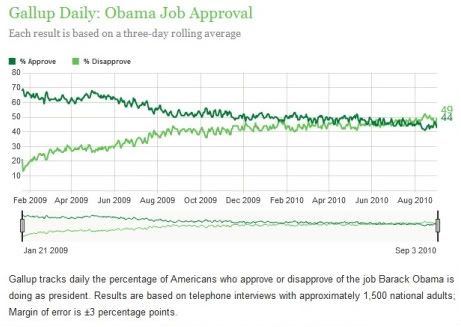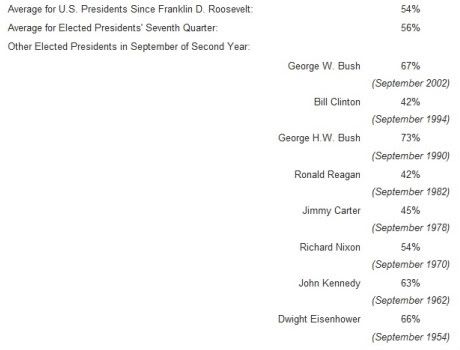I can’t exactly claim to have my fingertips on the pulse of the nation. I don’t travel, and I live in one of the reddest states in the union, meaning that for the sake of my own sanity I try not to draw too many political conclusions from what people around here think. I don’t even have cable anymore because I can’t afford it, so I usually miss the news, too. All I really know is what I read, and I’ll admit that probably means that my knowledge is pretty limited these days. Still, certain themes have become pervasive enough on the national scene that even I would have trouble missing out on them. One trend it would be all but impossible to miss is the general dissatisfaction voters seem to feel with both Obama and Democrats in general, and in the wake of that, the growing number of pundits, reporters, columnists, and average Joe’s (the plumber?) prophesying doom for the Democratic Party this November. We already know that incumbents are at a disadvantage this fall, but if perception is reality, then many Democratic candidates may be kind of… well, flat out screwed.
So just for the fun of it, let’s have a look at some numbers, some facts, and how we got here.
As of today, September 6th, 2010, here are president Barack Obama’s numbers according to Gallup:

How about a nice pretty graph to illustrate that:

Ouch. But how about some context: What does history say about presidential approval ratings at this stage of a president’s first term?

Yeahhhhh, so clearly Obama’s approval ratings aren’t exactly some unprecedented disaster, and the rankings at this point obviously don’t reflect the way second term elections will go or how history will ultimately remember a given president. The two highest approval ratings on that list were the two Bushes, and we know how that turned out. Actually, the rating I’m most interested in pointing out is St. Ronnie there, coming in at an underwhelming 42% in September of 1982. Now half the country thinks he’s the savior of the free world, and they’d reelect his corpse if they could because he’s the best thing since sliced bread Jesus.
…But apparently in September of 1982, he was just some Hollywood jackass governing in a crap economy.
Now, this is no defense of Reagan. I personally think he was a disaster of a president (and actor, and human being, and and and…). The point is, approval ratings at this stage of the game don’t mean anything either way. So why the fixation?
Time recently published an article entitled How Barack Obama Became Mr. Unpopular, and it gives us some upsetting statistics. Somehow, Obama went from being the most popular president at his inauguration (68% approval rating) since John F. Kennedy, to being the kind of man Time would dorkily label “Mr. Unpopular.”
This shift in perception – from Obama as political savior to Obama as creature of Washington – can be seen elsewhere. When Obama arrived in office in January ’09, his Gallup approval rating stood at 68%, a high for a newly elected leader not seen since John Kennedy in 1961. Today Obama’s job approval has been hovering in the mid-40s, which means that at least 1 in 4 Americans has changed his or her mind. The plunge has been particularly dramatic among independents, whites and those under age 30. With midterm elections just nine weeks off, instead of the generational transformation some Democrats predicted after 2008, the President’s party teeters on the brink of a broad setback in November, including the possible loss of both houses of Congress. By a 10-point margin, people say they will vote for Republicans over Democrats in Congress, the largest such gap ever recorded by Gallup.
White House aides explain this change as a largely inevitable reflection of the cycles of history. Midterms are almost always bad for first-term Presidents, and worse in hard times. “The public is rightly frustrated and angry with the economy,” says Dan Pfeiffer, Obama’s communications director, explaining the White House line. “There is no small tactical shift we could have made at any point that would have solved that problem.”